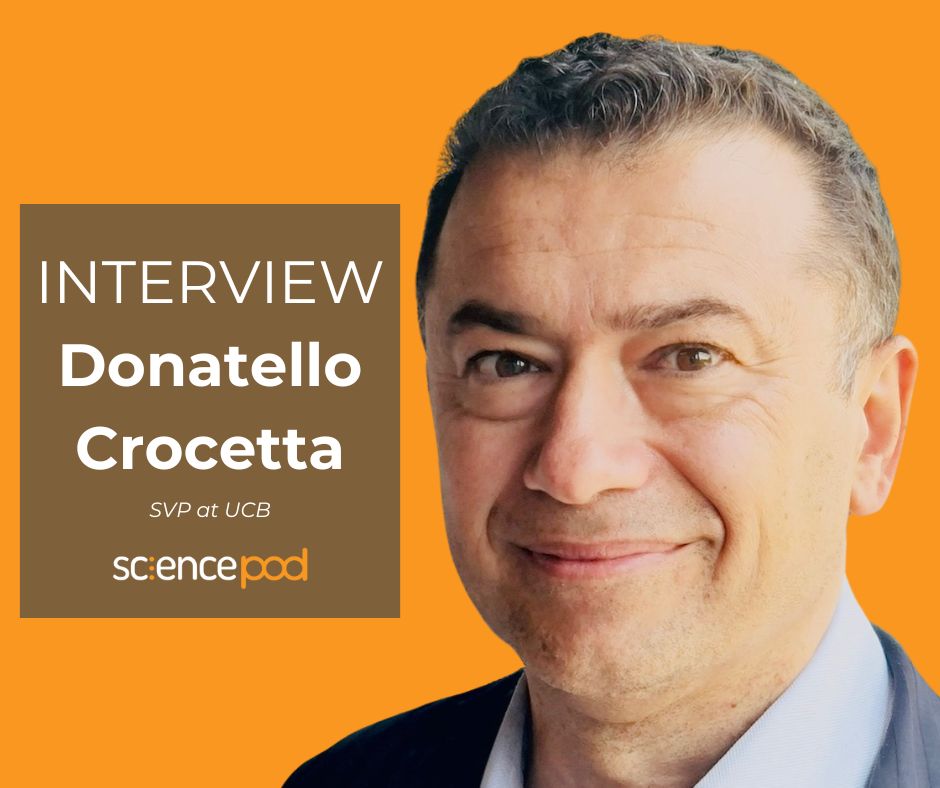Interview with Donatello Crocetta, SVP, Head of Global Rare & Rare Medical, Rare Disease Organisation at UCB.
“I’ve worked in several therapeutic areas and diseases in the past, and it is more or less the same issue; what is the role of the companies to enhance education and patient outcomes?” said Donatello Crocetta, Global Head of Rare Disease and Head of MEdical Affairs (Global and Regions) at UCB in Switzerland.
SciencePOD had the opportunity to speak with Donatello in advance of his panel discussion at Reuters Events Pharma 2024. The event will run from 16–18 April at the CCIB, Barcelona, Spain. He will speak at the panel discussion entitled “Great expectations, greater delivery: Configure innovative customer facing roles to keep up with HCPs dynamic needs.”
-
e
'I think the role of the company is to facilitate this level of worldwide connection because that can create a critical mass to then have an impact.'
Donatello Crocetta Tweet
What trends have you seen last year when engaging with HCPs?
I think last year showed that the digital literacy of healthcare professionals, patients and all the key pharma stakeholders is growing. Now it’s no longer a matter of if and how we want to evolve in that space; it’s finding the level of investment we want to make to reach the audience.
Now the discussion is more on what experience we want to provide the physicians and the stakeholder community with digital tools and leveraging the power of artificial intelligence. We need to make sure that the digital experience becomes much better than the face-to-face experience that they were used to. They should complement one another; digital tools should not just mirror what you get from face-to-face meetings.
Do you have any ideas of how to enhance that experience for customers?
One example is we’re using augmented reality technology with smart glasses to mirror the experience of patients affected by Myasthenia Gravis. This allows users to put themselves in the shoes of a patient and experience the daily challenges they face when doing normal daily activities. We are using this with healthcare professionals and for our own internal education to raise awareness on the patient experience. I’m sure that many other companies are doing more in this space. UCB is also partnering with other digital companies to support the development of digital tools that use AI to detect onset of symptoms linked to disease worsening and allow a timely interaction between HCP and patients.
Your role features a lot of work on rare diseases. What challenges does that present when working with HCPs?
Working in rare diseases is always challenging, often because most of physicians have seen only few of these patients and therefore can have limited knowledge of the disease. I think the question for a company always has been how we can help the community to educate the rest of these physicians to improve the referral pattern of patients towards centres of excellence able to get a quick diagnosis and use more targeted therapies.
As a company, you need to have the right strategy to reach the right target of HCPs without a massive investment. For example, at UCB we have worked closely with experts to build a scientific platform called Rare Disease Connect in Neurology (RDCN) which brings together all the critical stakeholders in the disease management: physicians, nurses, patient organisations. We have started with Myasthenia gravis, but this can be extended to other diseases in neurology and the neuro muscular space. We are working on an ultra-rare mitochondrial disease which affect approximately 2000-3000 patients worldwide Therefore, creating an educational platform for a few experts at a global level and key stakeholders is a critical step to improve diagnosis and treatment outcomes for these patients.
Some companies are also deploying a medical customer facing role with more transversal expertise to be able to address the growing needs of the rare community. One example is the Rare Conditions Partners (RCP) deployed by Roche which is a sort of in-field role representing the point of contact for the disease ecosystem consisting of therapeutic area experts, healthcare professionals, scientific organisations, patient advocacy groups, patients, and caregivers. UCB has a similar role in the field as well.
I think the responsibility of the company is to continuously innovate and experiment to deliver value and build trust with the entire healthcare community.
Do you think the sector needs more of these types of platforms?
Yes, though we often rely on a single company investing in that space, usually because they want to be the leader. But I believe we should be more open to present some partnership across the industry, even in the private-public partnership space. This is especially true for rare diseases where the level of investment of the company is limited.
What are some hurdles or some challenges that you see going forward in 2024?
I think the external environment is quite challenging. We have seen many biotechs failing and becoming bankrupt over the last year. So, the question becomes what level of investment and long-term planning a company can have when working in a very unstable geopolitical, financial, and regulatory environment.
My view is that companies need to continue to invest with purpose in innovation and new technology (automation, advanced analytics, gen AI), demonstrate value in wider healthcare to build trust with the community and ultimately focus on the ‘north star’ of delivering better outcomes for patients, including a more personalised health experience.

